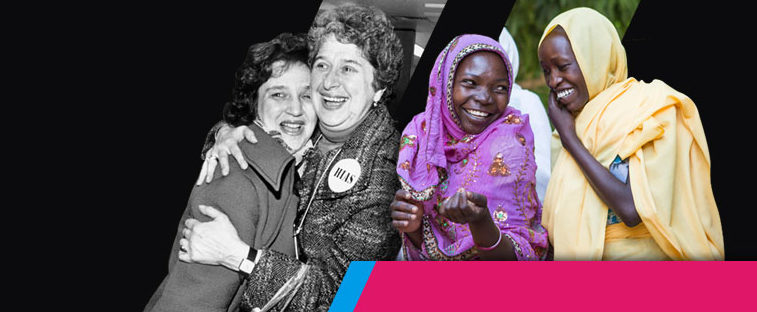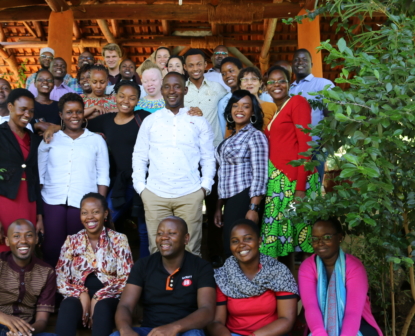Project
Safe Spaces for LGBTI Refugees in Nairobi
-
Amount Funded
192,351 EUROProject Duration
01 Aug 2017 - 31 Jul 2019 -
-
Lead organisation
Partners
Creatives Garage (CG) Community Empowerment Self Support Initiative (CESSI)
-
HIAS is a Jewish charitable, not for profit organisation originally founded in response to the late 19th and 20th century exodus of Jewish emigrants from Imperial Russia. HIAS protects most at risk refugees whose lives are in danger for being who they are. HIAS helps refugees rebuild their lives in safety, and advocates for the protection of refugees, ensuring that all displaced people are treated with dignity. HIAS began its Africa operations in 2002, launching the HIAS Refugee Trust of Kenya (HRTK). HRTK (also referred to HIAS Kenya) has its head office in Mimosa court, and operates in the three sites of Kayole, Kawangware and Eastleigh in Nairobi. These are poor neighbourhoods where the majority of refugee populations in Nairobi reside. Urban refugees in Nairobi include the Somali population, the largest, followed by Ethiopians, Congolese, Sudanese, Ugandan and Rwandese, while smaller refugee groups residing in Nairobi include those from Eritrea and Burundi. HIAS serves the most at risk urban refugees including those who identify as LGBTI persons living with disability, victims of torture, single heads of households, the elderly, those with chronic illnesses, youth, unaccompanied and separated children and women most at risk.
-
Organisation
HIAS is a Jewish charitable, not for profit organisation originally founded in response to the late 19th and 20th century exodus of Jewish emigrants from Imperial Russia. HIAS protects most at risk refugees whose lives are in danger for being who they are. HIAS helps refugees rebuild their lives in safety, and advocates for the protection of refugees, ensuring that all displaced people are treated with dignity. HIAS began its Africa operations in 2002, launching the HIAS Refugee Trust of Kenya (HRTK). HRTK (also referred to HIAS Kenya) has its head office in Mimosa court, and operates in the three sites of Kayole, Kawangware and Eastleigh in Nairobi. These are poor neighbourhoods where the majority of refugee populations in Nairobi reside. Urban refugees in Nairobi include the Somali population, the largest, followed by Ethiopians, Congolese, Sudanese, Ugandan and Rwandese, while smaller refugee groups residing in Nairobi include those from Eritrea and Burundi. HIAS serves the most at risk urban refugees including those who identify as LGBTI persons living with disability, victims of torture, single heads of households, the elderly, those with chronic illnesses, youth, unaccompanied and separated children and women most at risk.
-
Project
The Safe Spaces for LGBTI Refugees in Nairobi project works with the most vulnerable refugees and their host communities, including survivors of SGBV, survivors of torture, LGBTI persons, single-headed households and Persons living with Disabilities through the provision of mental health, legal and livelihood support. Together with Creatives Garage (CG) a multi-disciplinary collective space for artists and budding artists – to network, share ideas, collaborate, learn, gain market accessibility and push boundaries, and Community Empowerment Self Support Initiative (CESSI), a refugee led community of LGBTI refugees who have come together and started several business enterprises in Nairobi as means of earning a livelihood, HIAS aims to create an inclusive and safe environment for LGBTI refugees and their host communities to live and work. This is achieved through the implementation of three mutually reinforcing and supportive objectives that: • Increases the power and voice of the LGBTI community to advocate for their own protection • Increases the ability of LGBTI to earn an income in a safe and sustainable way, and • Builds the capacity of service providers to address the basic needs and protection concerns of Kenyan and refugee LGBTI people, ensuring their needs are met through confidential, appropriate and quality assistance.
-
-
The Safe Spaces for LGBTI Refugees in Nairobi project works with the most vulnerable refugees and their host communities, including survivors of SGBV, survivors of torture, LGBTI persons, single-headed households and Persons living with Disabilities through the provision of mental health, legal and livelihood support. Together with Creatives Garage (CG) a multi-disciplinary collective space for artists and budding artists – to network, share ideas, collaborate, learn, gain market accessibility and push boundaries, and Community Empowerment Self Support Initiative (CESSI), a refugee led community of LGBTI refugees who have come together and started several business enterprises in Nairobi as means of earning a livelihood, HIAS aims to create an inclusive and safe environment for LGBTI refugees and their host communities to live and work. This is achieved through the implementation of three mutually reinforcing and supportive objectives that: • Increases the power and voice of the LGBTI community to advocate for their own protection • Increases the ability of LGBTI to earn an income in a safe and sustainable way, and • Builds the capacity of service providers to address the basic needs and protection concerns of Kenyan and refugee LGBTI people, ensuring their needs are met through confidential, appropriate and quality assistance.
-
Expanding the rights of refugee LGBTI
While progress had been made in passing regulations to ensure the safety and dignity of refugees, Executive Order 13780, a review of the US Refugee Admissions Programme has caused major changes in the programme. This has greatly affected refugees. Refugees in Kenya were informed there was going to be limited departures in 2020 with no referrals to the USARP from UNHCR for new cases. In 2018, 22 LGBTI refugees and asylum seekers staged a protest in Kakuma Refugee Camp against acts of discrimination from other refugees and the host community the Turkana. Some members of the host community responded with violence leaving several refugees physically harmed. Later UNHCR relocated 218 LGBTI refugees from Kakuma with 71 of them self-relocated to Nairobi without authorization from UNHCR and the RAS, increasing the number of LGBTI refugees in the urban areas against the already strained resources.
The high court ruling of 2019 banning consensual same sex relations served as a blow to the petitioners, National Gay and Lesbian Human Rights Commission (NGLHRC), Gay and Lesbian Coalition of Kenya (GALCK) and Nyanza, Rift Valley and Western Network (NYARWEK) and the entire LGBTI community as a step back in the progress Kenya had made toward equality.
HIAS worked very closely with stakeholders to re-shape their perceptions and re-imagine a world in which LGBTI refugees’ rights and freedoms are respected and upheld. Two particular project activities were successful in encouraging this kind of inclusiveness; sensitivity training designed for law enforcement officers and the community dialogues (Tango Talks). The law enforcement officers that were engaged could easily identify with each of the subject matters discussed. Although the programme only accommodated a training for (7) officers (one of the police officers was not able to attend because he was called on duty), all the officers requested that the forum be organised with a wider law enforcement audience.
The community dialogues offered a great platform for interactions between LGBTI refugees, asylum seekers and local leaders. These dialogues enabled the voices of the LGBTI refugee and asylum-seeker community to be heard by their local leader representatives and bridge the divide in relation to the inter-ethnic differences experienced by both involved parties. The dialogues were informative, educational and provided a space that fostered stronger ties between the local leaders and refugees. The local leaders expressly voiced their concerns about refugees and asylum-seekers living in exclusionary spaces, which in their view, is what increases protection issues and vulnerability concerns. The local leaders brought incredible insights in relation to refugees and Kenyans living together in the community thus empowering each other as one big family, with an emphasis that in the African culture, family is not only those related by blood but those who live around you as well.
Through trainings, the 38 LGBTI refugees community leaders have increased knowledge and information that empowered them and other refugees to protect themselves against HIV/AIDS/STIs and issues surrounding violence within the LGBTI community. Further, they also have an increased understanding on the international, regional and national instruments that protect refugees and through the skills and confidence gained, they have been empowered to be accountable to themselves and the vulnerable persons in their community through effective, affirmative counselling techniques and methods.
“The partnership with HIAS was good and we have had a complementary working arrangement. HIAS Kenya has facilitated our legal aid clinics in a timely manner” [Key Informant from a partner organization]
The project has been able to increase the power and voice to influence LGBTI protection spaces and access to services through trainings to different actors, influenced the adoption of UNHCR urban policy through mentorship and economic empowerment of LGBTI community and lastly it has influenced organisational policies and programming to make agencies become more welcoming and inclusive of LGBTI rights through trainings and registration and inclusion of 150 LGBTI persons in the NHIF – National Health Insurance Fund, scheme
In regards to protection related interventions, there are no strong linkages between the livelihoods and health programme interventions, long-term development efforts and durable solutions. Therefore, more investment in time and resources to understand the dynamics of the urban environment and the complex social, political and economic background before livelihood interventions for urban LGBTI refugees is required to ensure long term impact and sustainability of interventions. HIAS will continue working towards closing these gaps as they continue to support LGBTI refugees.
- News




